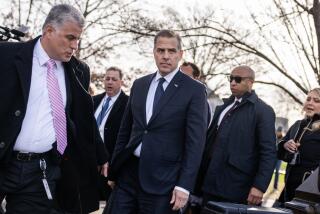First, Teapot Dome; Now, Coffee Pot Clinton
- Share via
In 1517, Pope Leo X was in a desperate war with the Duchy of Urbino and fast running out of money to finance the conflict. An advisor suggested a “once only” sale of indulgences or pardons for sinners. Previously such indulgences had been granted only for remission of past sins. This novel fund-raising technique called for the pardoning of sins that might be committed in the future.
Fast-forward 478 years to Sept. 7, 1995, and the Indian Treaty Room at the old Executive Office Building, where Dick Morris, the president’s political advisor, is arguing that a second term can be won only with a yearlong advertising campaign that will cost an unprecedented amount of money. And so, like the Renaissance pope anxious to retain his fief, the American president embarks upon a voracious and unparalleled quest for political money that wins him another term but further taints his scandal-bitten presidency.
The sums raised for the Democratic National Committee from the 358 guests invited to sip coffee with Clinton at the White House are stupefying--$27 million, according to an analysis conducted on behalf of this newspaper. One unnamed source was quoted as saying that many of the coffees were a “reward” for past support. But the record shows handsome sums coming in only after “face time” with the president.
What propelled Clinton into this orgy of money-grubbing was the fear that paralyzed him after his party’s defeat in the 1994 congressional elections, a loss that Clinton correctly saw as a personal repudiation of him and his policies. It was at this point that Clinton reached out for Morris, who had assisted in his resurrection after the loss of the Arkansas governorship in 1980.
Morris’ design for a reversal of fortune was, in his own words, to bombard the public with ads, “week after week, month after month from early July 1995 more or less continuously until election day in ’96.” This was essentially Morris’ strategy for Clinton’s comeback in Arkansas in 1982. What distinguished the 1996 plan from the Arkansas effort was its sheer magnitude.
Morris budgeted only $10 million for the balance of 1995, but in 1996, the bill just for ads run by the Democratic National Committee was $85 million. Clinton griped about having to raise that much money, saying (according to Morris’ account in his boastful book), “You don’t have any remote idea how hard I have to work, how hard Hillary has to work, how hard Al [Gore] has to work to raise this much money.” Morris observes that the president would have had to travel out of Washington to attend massive fund-raisers and shake hands with hundreds of people. Morris says nothing about the less arduous task of Clinton being White House concierge for the big-tippers who came calling for coffee and conversation.
No less energetic were the Republicans, who were running a kind of political escort service. Their out-of-towners flush enough to fork over $250,000 got guided tours through the bureaucracy and audiences with influential GOP lawmakers.
But it was Clinton who, from the lofty heights of the White House, really unleashed the torrent of gold in a manner so blatant and vulgar in its marketing of presidential access as to ape the worst depredations of the Harding administration. If the Teapot Dome was symbol of corruption in 1924, the kaffeeklatsch has become emblematic of the fund-raising excesses of 1996.
While the only violation of law uncovered at this point is the acceptance of contributions from noncitizens, the very magnitude of the solicitations and expenditures sends a message to Americans, already cynical and apathetic: The rich enjoy access to the government that mere citizens can only envy. It comes at a most inauspicious time, when the gap between the wealthiest Americans and the rest of us is widening alarmingly.
Trafficking in the forgiveness of sin led to a religious reformation in the 16th century. Perhaps the marketing of high-level access will set the stage for the purification of the political process at the end of the 20th century. Neither pope nor president can long endure without such cleansing.
More to Read
Get the L.A. Times Politics newsletter
Deeply reported insights into legislation, politics and policy from Sacramento, Washington and beyond. In your inbox twice per week.
You may occasionally receive promotional content from the Los Angeles Times.










